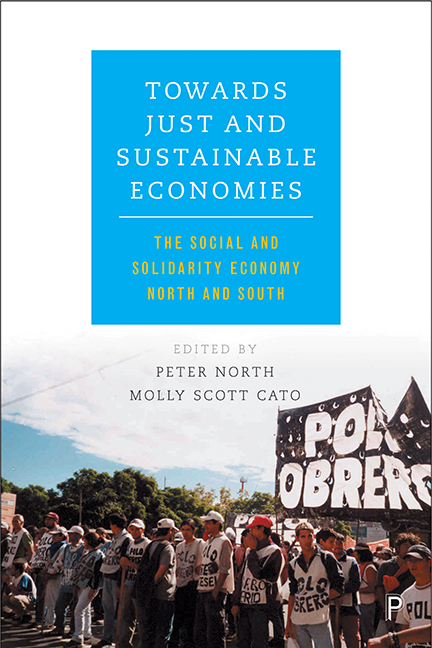Book contents
- Frontmatter
- Dedication
- Contents
- List of figures and tables
- Notes on contributors
- Acknowledgements
- One Introduction: new economies North and South – sharing the transition to a just and sustainable future
- Part I Theoretical perspectives on the social and solidarity economy
- Part II The social and solidarity economy as a site of social innovation
- Part III The social and solidarity economy and the state
- Part IV Policy translation between North and South
- Index
Two - Towards a new economics: concepts and experiences from Latin America
Published online by Cambridge University Press: 05 April 2022
- Frontmatter
- Dedication
- Contents
- List of figures and tables
- Notes on contributors
- Acknowledgements
- One Introduction: new economies North and South – sharing the transition to a just and sustainable future
- Part I Theoretical perspectives on the social and solidarity economy
- Part II The social and solidarity economy as a site of social innovation
- Part III The social and solidarity economy and the state
- Part IV Policy translation between North and South
- Index
Summary
Introduction
On the basis of a critique of the market economy advocated by neoliberal economic doctrine, this chapter presents the social and solidarity economy (SSE) both as an alternative theory and as a counter-hegemonic programme of political action framed within the substantivist economics current inspired by the works of Karl Polanyi and Karl Marx. The chapter identifies the ethical and economic principles, and the institutions, that contrast the practices of a market economy with those of the SSE. It considers how the ‘New Left’ in power in Bolivia, Ecuador, Venezuela and Argentina, and to some extent in Brazil, has institutionally supported the growth of the SSE. It discusses some of the concrete projects of economic transformation, and the new constitutional and/or public policy processes. Finally, the chapter discusses the advances and contradictions that the SSE sector faces in Latin America, and offers some generalisable lessons that have been learned so far in the 21st century.
The chapter aims to contribute to debates about the nature of the New Left or ‘pink tide’ Latin American governments with an analysis of the projects and transformations that have taken place since these governments came to power. The objective is not to present ideal models, but to discuss social and political projects involving contradictions and conflicts, even among themselves and their supporters, that are not always easily resolved. Specifically, the chapter aims to gain an understanding of how the New Left states have supported these economic processes, an issue that is not always adequately taken into account. From this, we focus on clarifying the conceptual framework on which it is proposed that further analyses of this issue can be based.
In terms of method, the starting point is the necessary critical analysis of the market economy, an obligatory reference given that it is the market that the neoconservative political project – with its economic ideology known as neoliberalism – seeks to impose on Latin America, exposing the relationships between society and economy to the interplay of forces of the real-world global market. Similarly, the question of how to move from an (admittedly historically incomplete) market economy to an economy with a market in a transformative process guided by the interests of popular sectors must also be subjected to critical thought.
- Type
- Chapter
- Information
- Towards Just and Sustainable EconomiesThe Social and Solidarity Economy North and South, pp. 15 - 36Publisher: Bristol University PressPrint publication year: 2017

